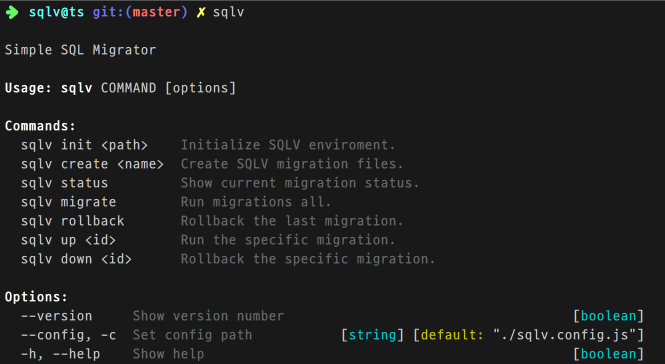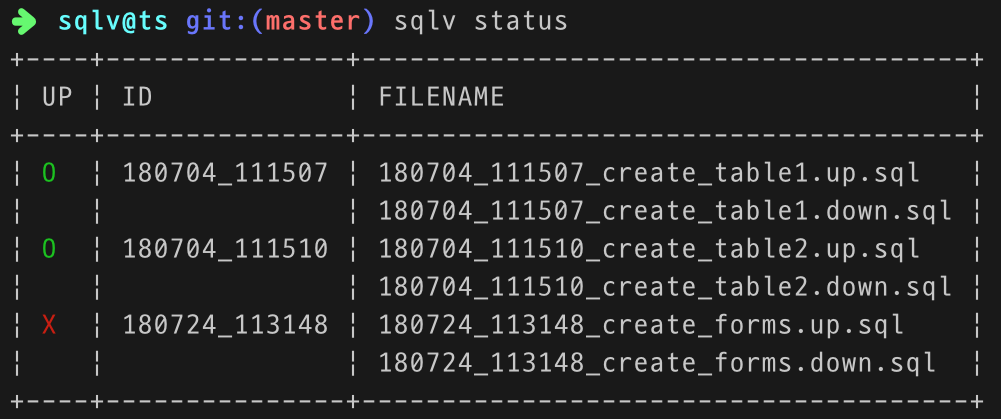SQLV
Let SQL do what SQL can.
SQLV is very simple SQL Migrator.

Installation
$ npm i sqlv -DChange the package.json file to the following:
Now, Type the following to print the version.
$ npm run sqlv --versionTo use it globally, please do the following:
$ npm i sqlv -gUsage
Initialize Project
$ sqlv init .$ sqlv init yourprojectpathThis will create a configuration file, sqlv.config.js.
You need to install additional packages(mysql, mysql2, pg, sqlite3) to match your database. SQLV is
based on the @stdjs/database.
example,
$ npm i mysql$ npm i mysql2$ npm i pg$ npm i sqlite3Now, edit sqlv.config.js file as follows:
moduleexports = adapter: "mysql2" host: "localhost" database: "test" user: "root" password: "********"Create Migrations
$ sqlv create create_init_tablesTwo files(181201_000000_create_init_tables.up.sql, 181201_000000_create_init_tables.down.sql) are created under
the ./migrations directory.
Migrate
$ sqlv migrateup 181201_000000 ... OKShow Current Status

$ sqlv statusRollback
$ sqlv rollbackdown 181201_000000 ... OKMigrate Specific Version
$ sqlv up 181201_000000up 181201_000000 ... OKRollback Specific Version
$ sqlv down 181201_000000down 181201_000000 ... OKConfig
Change Migration Directory
By default, the migration files are created in the ./migrations directory. If you want to change this, please set up as follows:
moduleexports = migrations: "otherdirectory" // default "migrations"Multi-Connection
If you have multiple DB connections, you can use:
// sqlv.config.jsmoduleexports = connections: default: adapter: "mysql" host: "localhost" database: "test" user: "root" password: "" pg: adapter: "pg" user: "root" password: "" Migrations files, you can specify a connection with a comment.
-- @sqlv connection: pg CREATE /* ...SQL Syntax.... */;You can specify multiple connections for one file.
-- @sqlv connection: default CREATE /* ...SQL Syntax.... */;CREATE /* ...SQL Syntax.... */;CREATE /* ...SQL Syntax.... */; -- @sqlv connection: pg CREATE /* ...SQL Syntax.... */;CREATE /* ...SQL Syntax.... */;Change History Manager
There are two history manager driver, json and database.
moduleexports = history: driver: "json" moduleexports = history: driver: "json" path: "./yourown.history.json" Migration information uses the migrations table in the database. If you want to change this, you can do the following:
moduleexports = connections: default: ... otherdatabase: ... history: driver: "database" connection: "otherdatabase" table: "yourownmigrationtable" // default "migrations" If you want to use multiple databases and set up a specific database, use:
License
MIT






